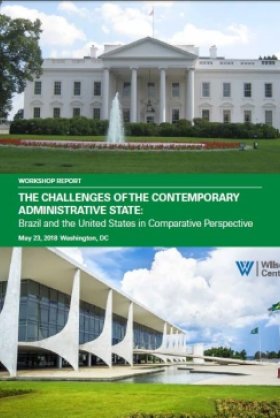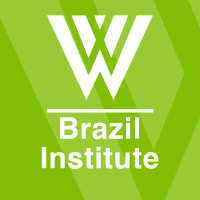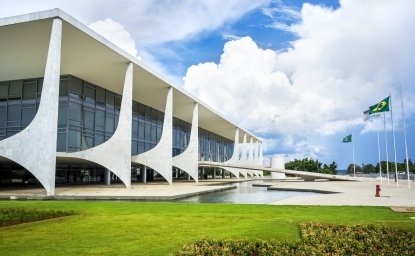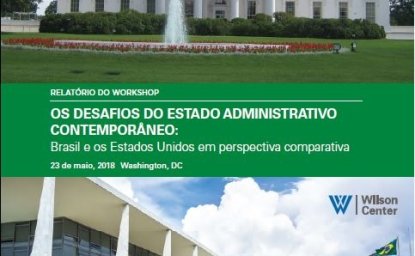Workshop Report | The Challenges of the Contemporary Administrative State: Brazil and the United States in Comparative Perspective


Brazil and the United States are both currently in the midst of crises of the administrative state. Although the nature of the crises and their origins differs, there is a great deal to learn from a comparative analysis of both countries during this moment of uncertainty. On May 23, 2018, the Wilson Center’s Brazil Institute and Brazil’s National School of Public Administration hosted a full-day workshop in Washington, DC, to explore the experiences of scholars and policy practitioners from both countries and gain a better sense for how each country can strengthen public administration and management to more effectively carry out the critical work of government.
The full workshop report is available for download above in English (for the Portuguese, click here). The powerpoints from the workshop are available on the event page.
Key Takeaways from the Workshop Report
Public administration is the lynchpin between a government’s mission and its actual impact. Yet governments around the world frequently struggle to implement more effective and efficient administrative and management processes. Most U.S. political analysts are acutely aware of the current challenges to effective public administration in Washington, from negotiating and passing annual budgets to effectively managing the various agencies and their large federal workforces. Brazil is similarly confronting the challenges of rising deficits and an often unwieldy bureaucracy as it seeks to overcome the profound political crisis and deep economic recession of the last four years. There has been growing dissatisfaction in each country over the government’s ability to manage global challenges and domestic problems, and although politicians have capitalized on problems to win elections, once in office they have failed to adequately address them. Public trust in institutions has fallen and faith in democracy has diminished. Although their histories diverge in several critical ways, Brazil and the United States are the two largest democracies in the Western Hemisphere, and there are valuable lessons to be learned through comparing the current administrative environments in both countries.
Several key themes and best practices emerged from the workshop presentations and discussions:
Successful strategic planning requires intuition and foresight, a long-term perspective, and deliberate implementation. Although strategic planning is widely recognized as important, many institutions do it poorly. It is critical for policymakers and public administrators to understand that strategic planning is different than simple long-term planning, and requires a broader, systems approach.
- Strategic planning should be focused on achieving the government’s mission, through setting long-term priorities and envisioning what the future might bring (challenges and opportunities). Francisco Gaetani noted that long-term thinking allows countries to factor different future scenarios into their planning process, including demographic and social shifts as well as technological advances. Carlos Santiso argued that governments need to completely consider the potential ramifications of technology: it will change the way governments deliver services and engage with citizens, and will also dramatically change the nature of public sector work.
- Strategic planning should not be a theoretical exercise, which means consideration must be given to feasibility, implementation, and accountability. Meg Lundsager stated policymakers need to consider a number of questions when designing a plan: Will the plan and its objectives have popular support? Is the plan feasible under existing regulations and statutes, or will it require new legislation? How will success be measured? What would failure look like?
- Policymakers should be open to considering lessons from a broad range of organizations and experiences in order to improve their own processes. Francisco Gaetani noted that traditionally, Brazil has not looked to international experiences in designing its own structures; he contended that the Brazilian state should take a broader perspective in looking for best practices. Moreover, as Edwin Lau noted, governments are not the only institutions to engage in strategic planning or the other administrative challenges discussed at the workshop: private sector companies, non-profits, and other organizations may be able to offer lessons as well, based on their own experiences, that prove useful for the state.
Sound public administration must balance immediate political demands against the government’s long-term objectives. A short term political focus makes long-term strategic planning difficult.
- Election cycles can have a detrimental effect on the administrative state’s capacity to implement long-term plans. Francisco Gaetani noted that, in Brazil, strategic initiatives are often tied to election cycles which keeps policymakers from taking a truly long-term strategic perspective. Strategic interests are often hindered by the “temptation of doing politics”. Similarly, in the United States, short term political calculus among U.S. party leaders—scoring a “win” for the base—often takes precedence over finding compromises to support strategic, long-term growth. As Michael Forster noted, this short-term perspective comes at a cost: political fighting during the U.S. federal budgeting process often leaves federal agencies guessing what their annual budget will be, and knowing that every election cycle has the potential to upend the calculus. Moreover, during election years, the work of government often grinds to a halt, making planning impossible.
- It is often difficult to convince the public (and therefore politicians) that fiscal responsibility is important—this is true in the US and in Brazil—because the focus is often on immediate needs and wants instead of long-term objectives. Felipe Salto argued that Brazilian politicians lack the “spirit of fiscal responsibility,” and tend to kick the ball down the road instead of tackling unpopular yet critical spending reforms. The same can be said of the United States, as evidenced by the frequent inability of the U.S. Congress to pass a budget that does not contribute to the federal deficit.
Every aspect of public administration should be viewed through a strategic lens. The purpose of the administrative state is to develop and implement policies that reflect the government’s priorities and serve its citizens. As the OECD recommends, a strategic systems approach requires viewing “the entire operation of government as an interconnected system rather than disparate pieces.” This means that interagency cooperation should be prioritized, as well as cooperation within agencies, to ensure all parts of the government are working together towards strategic objectives. It also means that individual government functions should be considered strategically.
- The administrative state should be wary of becoming process-driven rather than mission-driven. As Carlos Santiso noted, excessive red tape imposes significant transaction costs on individuals and organizations, including the government, undermining its ability to implement its strategy. Dustin Brown argued that the excess of bureaucratic rules in the United States, stemming from a lack of trust in civil servants, constrains the ability of public sector agents to innovate and problem-solve.
- Cooperation between individuals and agencies is critical to achieving strategic objectives, as Meg Lundsager argued. The challenge is overcoming the tendency of each agency to become a silo, focused on its own work and territory within the policy space. The U.S. executive government has several entities devoted to coordinating strategy and policy across agencies, such as the National Security Council or the National Economic Council; nevertheless, challenges remain. Brazil faces a similar hurdle in fostering interagency cooperation, which is perhaps exacerbated by the strict career paths—tied to specific agencies—of its civil service. In Brazil, the federalist system also requires the federal government to cooperate closely with state and local governments to achieve its objectives.
- Individual functions, including those not directly involved in policy creation, should also be considered from a strategic perspective as they all support the government’s ability to achieve its objectives. Edwin Lau argued that human resource management in particular needs to be reconceived as a central element for a successful administrative state, rather than just a necessary cost of doing business. Dustin Brown noted the importance of defining the desired outcomes in order to understand civil service needs. The hiring process for civil servants in Brazil is one example. Nelson Marcroni and Edwin Lau both argued that the Brazilian recruitment process is divorced from the actual needs of the state, based on poorly targeted entrance exams, which have led to a poor fit between the public sector workforce and the work to be done. France, in contrast, offers a good example of strategic human resource management, with a centralized human resource system that works across agencies to coordinate current and future employment needs.
Effective public administration requires a professional, autonomous, capable, mission-driven civil service.
- States should develop capacities at an individual level. Fernando Filgueiras noted that individual capacity has a significant impact, as policies depend on actions performed by individuals. Edwin Lau argued that governments should hire and cultivate civil servants with competencies that go beyond simple skills, from data literacy to curiosity. Carlos Santiso similarly remarked that civil servants need to develop new skills for a twenty-first century state, including technology and data science capabilities.
- Civil service reforms should focus on strengthening the professionalization and autonomy of the civil service. There is a tendency to politicize the civil service, whether through patronage jobs after an election or holding it up as a symbol of government excess. Matthew Taylor and Luiz Alberto dos Santos argued that the over-politicization of the public sector, and the corruption that often accompanies it, is one of the main challenges facing Brazilian public administration. A number of panelists argued in favor of reforms to increase the autonomy and transparency of the civil service as a means of improving the effectiveness of the administration state, including strengthening merit-based hiring and promotion processes. Several Brazilian agencies already do this well, as Matthew Taylor found in his research, and their processes should be studied and implemented more widely. Edwin Lau noted that the Finnish system of performance management offers one example of how a country can reward and incentivize effectiveness and efficiency.
As the world rapidly changes, the administrative state needs to adjust, adapt, and innovate to meet new demands and opportunities.
- A reoccurring theme among the panelists was the need for governments to be open to bottom-up, collaborative reform. Dustin Brown cited a U.S. government survey which collected data from 27,000 individual offices across the administrative state to gain a better understanding of the competencies and requirements at all levels of government. In this respect, new technologies and data can help the administrative state to break down traditional hierarchies by providing the center a more accurate view of the entire government, allowing for more effectively targeted internal administrative reforms.
- Governments can also use technology to improve service delivery and external engagement with citizens. Bolsa Família, as Deborah Wetzel notes, is a good example of this trend at work.
Workshop participants concluded that the administrative state must work to maintain its relevance in an ever-changing and complicated world, through building public trust, serving as a steward for the resources of government, and promoting sustainable and inclusive development. The ongoing administrative challenges in Brazil and the United States only underscore the fundamental role that public administration plays in a government’s ability to meet its objectives and serve its citizens.
Author
Contributor

Senior Director, Albright Stonebridge Group

Brazil Institute
The Brazil Institute—the only country-specific policy institution focused on Brazil in Washington—aims to deepen understanding of Brazil’s complex landscape and strengthen relations between Brazilian and US institutions across all sectors. Read more





